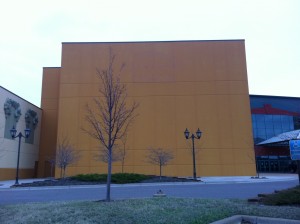A Big Lake Township church is challenging the City of St. Michael for the rights to purchase the former Cinemagic Movie Theater site along Interstate 94 and Highway 241, issuing a letter via the church’s attorneys asking the city to discard its current zoning laws in order to clear the way for a possible transaction.
That letter, issued to city staff May 30, led the St. Michael City Council and St. Michael City Attorney Dave Lenhardt to wrap up Tuesday’s regular city council meeting with a short discussion addressing any possible litigation.
 “It’s very premature to say anything is happening in the legal process,” Lenhardt said. “However, the letter sent to staff sets forth the church’s opinion, based in federal law, that they have a right to move ahead with the purchase.”
“It’s very premature to say anything is happening in the legal process,” Lenhardt said. “However, the letter sent to staff sets forth the church’s opinion, based in federal law, that they have a right to move ahead with the purchase.”
That’s not something the city disagrees with. However, the church, represented attorney C. Greg Howese, believes the city’s demand the church use the “regular” government process – starting with a request for a zoning ordinance variance or even and ordinance change in front of the St. Michael Planning Commission – places “undue burden” on the church in its attempts to purchase the theater, which closed in 2011.
The church believes the city’s current code, which does not allow a church to be constructed in an area designated for commercial development (to paraphrase), is in in violation of federal law.
The attorneys from the church are citing the Religious Land Use and Institutionalized Persons Act, or RLUIPA, an act confirmed in district court, in 2010, which states cities can’t place “undue burden” on religious organizations looking to rent or purchase gathering space, among other factors.
Lenhardt “100 percent disagrees” with the church’s position that asking the church to submit a variance request or zoning ordinance change is “placing undue burden” on the church.
“This is exactly how we would proceed with any organization looking to move ahead in the process,” he said. If the church can show substantial burden, that’s a legal opinion. But as a city, we’re required by state law to use governmental reasoning. And to regulate a church differently than a non-church is open to question, certainly,” when it comes to zoning requirements.
Lenhardt said he’d advise the council to allow him to continue with any sort of discussion the church and city want to hold in the future, making sure any legal matters introduced would be handled at that level.
“If it comes to a point where we need to address any sort of pending litigation, the council would be advised to close a portion of the meeting and do that. But that’s premature, again, at this point. This letter does seem disconcerting, and that they’re threatening to sue the city if we don’t dispose of the current ordinance now,” Lenhardt said. “But there’s nothing pending with the city at this time. As it is now, we can’t ignore the state requirements and discard our process.”
Community Development Director Marc Weigle said he’ll continue to work with the church, now with Lenhardt’s advisement, on any process or future transaction.